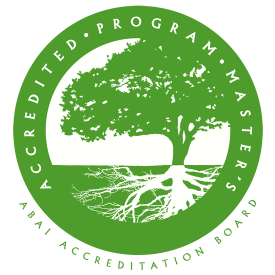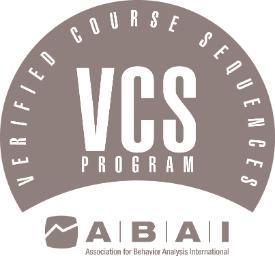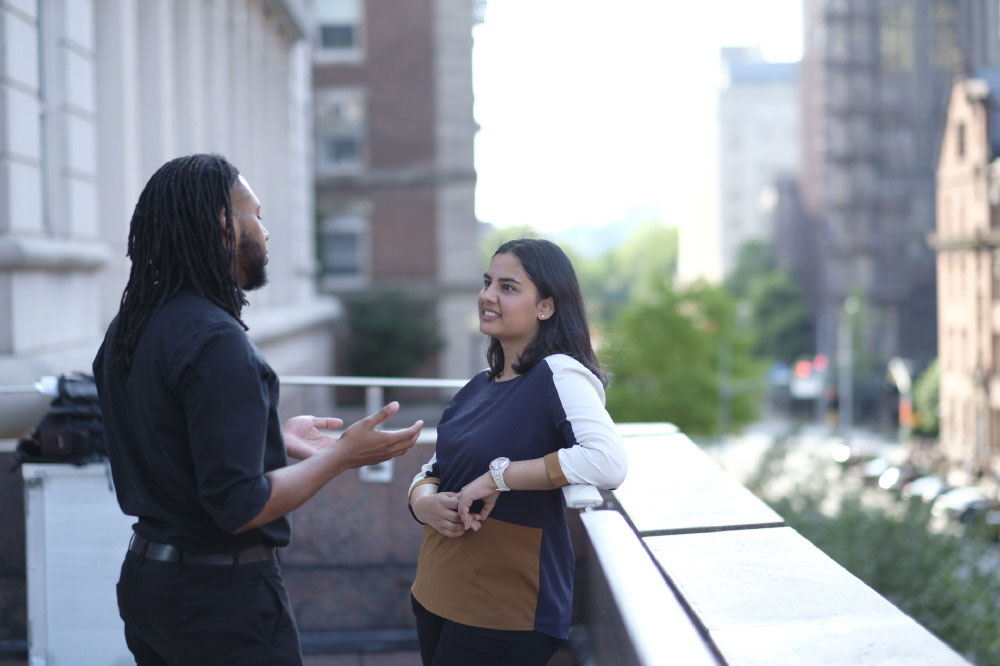Teaching Students with Disabilities: Applied Behavior Analysis
Teaching as Applied Behavior Analysis is a strategic scientific educational model in which all instruction used by teachers is based on scientific evidence. In this approach, teachers use scientific procedures in the process of fitting the appropriate science-based practices to individual students’ learning and language developmental needs. The program prepares graduates to be dually certified in general and special education from birth to Grade 6 in New York State and reciprocating states and also prepares students to sit for the exam leading to NYS licensure in ABA. Students who successfully complete the M.A. core courses will satisfy the requirements to sit for the Board Certified Behavior Analyst (BCBA) exam. All students accepted into the program are placed in teacher assistant positions in model schools and classrooms that practice teaching as applied behavior analysis.
All M.A. students must continually enroll in internship.
M.A. students must meet the liberal arts requirements for NYS teacher certification (by the completion of the program). This necessitates 6 credit hours of science (taught by a science department—social sciences do not count). 6 cr. hrs. of math (taught by a math dept.), 6 cr. hrs. of history/ELA/social studies, and 6 cr. hrs. of a foreign language. AP credits taken during high school or documented demonstration of proficiency (e.g., an exam or CLEP) are also acceptable.


The Association for Behavior Analysis International has verified the following courses toward the coursework requirements for eligibility to take the Board Certified Behavior Analyst® or Board Certified Assistant Behavior Analyst® examination. Applicants will need to meet additional requirements before they can be deemed eligible to take the examination.

Admission Information
Displaying requirements for the Spring 2025, Summer 2025, and Fall 2025 terms.
Master of Arts
- Points/Credits: 47
- Entry Terms: Fall
- Enrollment Formats: Full-Time Campus-Based
Certification
View Public Disclosure Notification
- Dual Certification: NY State Initial: Students with Disabilities Birth-2, Students with Disabilities 1-6, Early Childhood Birth-Grade 2/Childhood 1-6
Application Deadlines
| Entry Term Available | Priority Deadlines | Final Deadlines | Extended Deadlines |
|---|---|---|---|
| Spring | N/A | N/A | N/A |
| Summer | N/A | N/A | N/A |
| Fall | January 15, 2025 | July 1, 2025 | N/A |
Select programs remain open beyond our standard application deadlines, such as those with an extended deadline or those that are rolling (open until June or July). If your program is rolling or has an extended deadline indicated above, applications are reviewed as they are received and on a space-available basis. We recommend you complete your application as soon as possible as these programs can close earlier if full capacity has been met.
Application Requirements
| Requirement | |
|---|---|
| Online Degree Application, including Statement of Purpose and Resume | |
| Transcripts and/or Course-by-Course Evaluations for all Undergraduate/Graduate Coursework Completed | |
| Results from an accepted English Proficiency Exam (if applicable) | |
| $75 Application Fee | |
| Two (2) Letters of Recommendation |
For admission-related inquiries, please contact HAEPadmission@tc.columbia.edu.
Requirements from the TC Catalog (AY 2024-2025)
Displaying catalog information for the Fall 2024, Spring 2025 and Summer 2025 terms.
Our program is recognized for its excellence in training teachers in using scientific tools to bridge the educational gap and accelerate learning for all children (Greer, 2007). It is also internationally recognized for training teachers, researchers, and leaders in early educational and language developmental interventions for children with autism spectrum disorders (ages 2-5) and effective inclusion practices. Our graduates are expert in identifying missing verbal developmental stages (Greer & Du, 2015; Greer & Keohane, 2007, 2009; Greer & Ross, 2008—see www.cabasschools.org for a list of publications) and providing interventions that result in children attaining developmental stages when they are missing.
We encourage students in the M.A. program to also enroll in the Certificate in Applied Behavior Analysis program. This includes no additional coursework, but adding the Certificate allows one to meet the education requirements for the New York State License in Behavior Analysis.
The objective of our M.A. program is to prepare teachers,teacher trainers, and clinicians to use measurably effective instructional practices to accelerate all children’s educational progress, including measurable increases in enjoying learning and schooling, academic literacy, problem solving, and self-management. A key to doing this is the acceleration of children’s language development, which appears to be the root problem faced by English language learners, minority children from economically disenfranchised families, and children with autism spectrum diagnoses. Recent research findings provide exciting new ways to do this. Moreover, accelerated instruction is needed for children from well-to-do-families, if we are to assume international leadership in education. In order to meet these objectives, we provide instructional experiences to teach our graduate-student teacher trainees the following aspects of effective teaching:
-
Utilize research-based procedures for all aspects and subject areas of teaching preschool and elementary-age children.
-
Manage classrooms and schools such that children are well behaved and motivated to learn, using positive and non-coercive practices.
-
Master the existing science of learning and teaching as it is applied to the varied needs of children.
-
Master protocols to identify and induce missing language developmental cusps and capabilities that result in children learning to learn material they could not learn before and how to learn in new ways (e.g., by observation and incidental experiences).
-
Master how to use key educational standards and how to match existing tested curricula and tested teaching practices to categories of students and individual students in order to ensure that the standards are achieved.
-
Master how to continuously and directly measure all students’ progress in achieving standards and new developmental stages and use that measurement to drive instructional practice, including the selection of alternative scientific practices when initial best practices are not successful with children.
-
Master how to scientifically analyze the source of student learning problems and inadequate teaching.
-
Learn to draw on evidence from cognitive learning,developmental research, and reading/writing literacy research implemented through procedures from teaching as applied behavior analysis.
-
Master how to teach children to be self-learners.
The Teaching as Applied Behavior Analysis Program is an approach to teacher training in which all instruction used by teachers is based on scientific evidence and the use of scientific procedures to fit the appropriate science-based practices to individual students’ varied learning and language developmental needs. The program prepares graduates to be dually certified to teach students from birth to Grade 6 in New York State.
Students may also apply for certification in other states according to state-specific processes and requirements, and inter-state reciprocal agreements. The program is an Association for Behavior Analysis International Verified Course Sequence (VCS) member. Students who wish to obtain New York State Licensure for Behavior Analysis must be dually enrolled in the Advanced Certificate Applied Behavior Analysis program. The M.A.program includes all of the coursework required for the advanced certificate ABA program. In addition to coursework, both BCBA and LBA requirements include completion of supervised fieldwork hours, many or all of which can be gained while in the program, and passage of the NYSLBA and Board Certified Behavior Analyst (BCBA) exams upon successful completion of the program. During the two-year MA program, students complete student teaching requirements during internships in schools and classrooms that practice teaching as applied behavior analysis, under the mentorship of PhD students or graduates who are certified teachers. Students need to work at internship sites for 20-40 hours per week and during two semesters students have to work full time in order to meet teacher certification requirements. Students also receive supervision from appropriately credentialed BCBAs/LBAs. The training of teachers is also based on scientifically-tested procedures (i.e., we teach our graduate students until they demonstrate mastery of using scientific practices). Teacher trainees are taught until they master the science and its application with all children from 2 years to upper elementary as specified in the CABAS® Teacher Ranks.
All of the training is done in classrooms that practice the CABAS® or CABAS® Accelerated Independent Learner Model (AIL) (www.cabasschools.org). Students are trained in paid internship positions, under the supervision of experienced scientist-practitioners in school placements and attend classes in the evening. What is done with the children in the classrooms is the content of the ten core graduate courses-- scientific findings and teaching procedures. What is taught in the core courses and the related courses is placed into practice daily. The effectiveness of the numerous procedures is well documented in the literature. Recent evidence concerning the outcomes for the children in the classes in which our trainees are taught show that the children demonstrate 4 to 7 times more learning than comparable peers in non-CABAS® settings. Children in our CABAS® AIL classes (general education) perform from two to four levels above their current grade level on standardized tests across reading, language, and mathematics. These children include those who receive free or reduced-price lunch, minority children, English language learners, children with learning delay diagnoses, and upper middle-class children. Teachers and teacher assistants collect direct measures of all the children’s responses to instruction and the achievement of state standards. The model classrooms where our M.A. and Ph.D. graduate students are trained include the Fred S. Keller Preschool (children with and without diagnoses from 18 months to age 5), the Morristown AIL classes Pre-K to 6, and Rockland BOCES elementary district-based classes. Our full-time and adjunct faculty members are onsite in the schools on a regular basis and are accountable for outcomes for our teacher trainees and the children they teach.
All of the work in the classroom and school settings is tied to the ten core courses in the M.A. program that are devoted to classroom management, curriculum design, effective pedagogical practices, and the advancement of a science of teaching. The other classes in the program are devoted to various scientific approaches to instruction, learning, and development. M.A. students rotate placements across different types of students and ages until they achieve minimal mastery of the relevant scientifically based teaching repertoires.
Research is an important component of the M.A. program. Several courses require research tied to improving the educational attainment of children our students work with. This work culminates in an Integrative Project that functions as a thesis.
Successful applicants will present evidence of excellent undergraduate academic performance in liberal arts degrees or degrees with strong liberal arts requirements, strong recommendations, and a passion for working with children whose future prognosis depends on highly effective instructional interventions. The program is academically rigorous, and the applied component is demanding. Graduates of the program are highly sought after by public schools and graduate programs. Between 15 and 25 applicants are accepted annually.
There are other approaches to teaching and the training of teachers, and some who wish to become teachers will find those approaches more in keeping with their goals. But for those who are interested in a measurably effective and scientific approach and who are committed to bridging the educational gap and high-quality education for all children, we invite applicants to join us in what we find to be exceptionally exciting and rewarding work.
Specialization Requirements, Applied Behavior Analysis:
-
HBSE 4015 ABA I: Concepts and Principles in Pedagogy, Curriculum, and Management
-
HBSE 4016 ABA II: Foundational Concepts and Epistemology of Basic and Applied Behavior Analysis
-
HBSE 4017 ABA III: Verbal Development, Curriculum, and Pedagogy
-
HBSE 4044 Methods 1: Research Methods in Pedagogy, Curriculum, and Management
-
HBSE 4045 Methods 2: Curricular and Pedagogical Operations for Teaching the Foundations of Functional Academic Literacy
-
HBSE 4046 Methods 3: Curricular and Pedagogical Operations for Teaching Advanced Functional Academic Literacy
-
HBSE 4047 Record-Keeping in Applied Behavior Analysis (required for NYS licensure in ABA)
-
HBSE 4048 Working with Families of Children with Autism
-
HBSE 4049 Professional and ethical issues in behavior analysis
-
HBSE 4704 Observation and student teaching in special education: Applied behavioral analysis and behavioral disorders (4 terms)
-
IND 4000 Master’s Candidate (Integrative Project, i.e., thesis) (0 credits)
Breadth Requirement and Reading/Math Requirement:
For the list of required cognate courses that provide breadth scholarship and practice, contact the program coordinator or the special education secretary. In order to broaden the student’s background in education, twoTeachers College courses outside the Teachers College major program must be completed. Independent of this, students are required to complete two reading courses and one mathematics course. This means two math/reading courses have to come from outside the program and one course can come from within the program, or outside the program. Examples of acceptable courses (faculty approval required for alternative courses):
-
HBSK 4072: Theory and Techniques of Assessment and Intervention in Reading
-
MSTM 5010, Mathematics in the Elementary School
-
HUDK 4027: Development of Mathematical Thinking
-
HBSK 4074: Reading and Comprehension Strategies and Study Skills
(Alternatively, students may take HBSK 5099: Writing Interventions Theory and Practice in lieu of one of the reading courses if scheduling conflicts exist.)
The New York State Education Department (NYSED) mandates teacher certification requirements that are needed for program completion and graduation which are listed in the Office of Teacher Education section of the catalog.